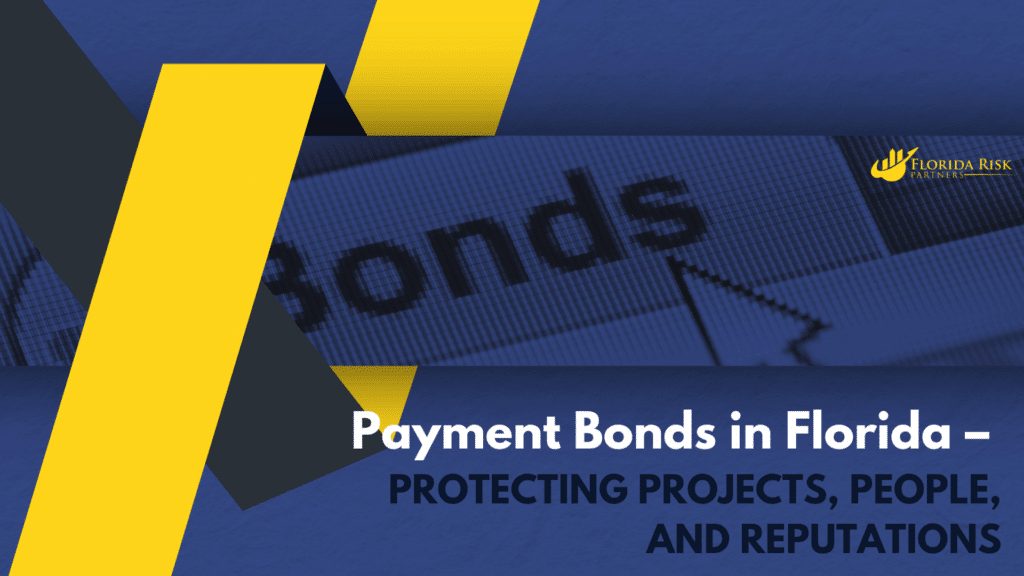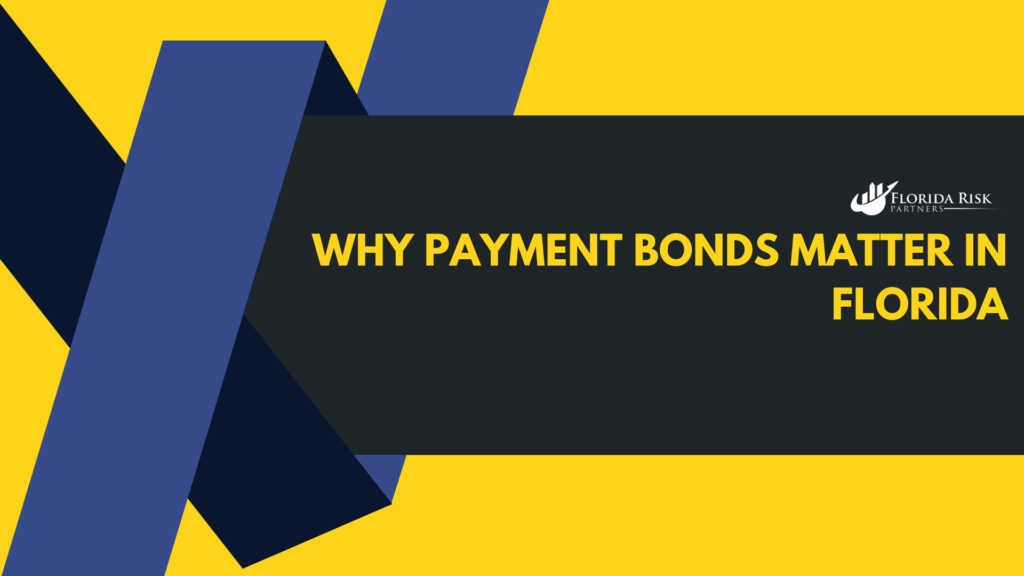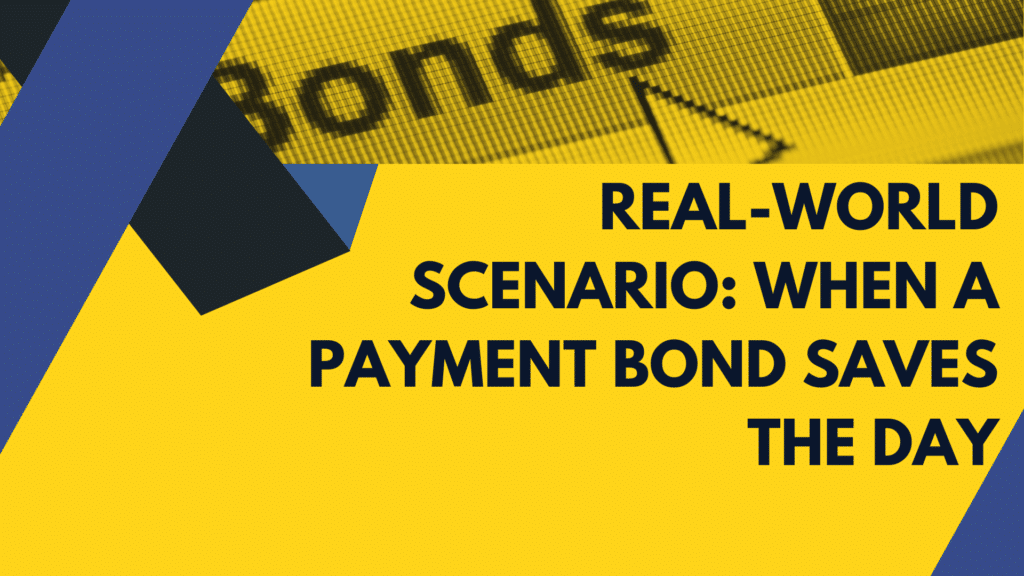-
Main Office: 1434 E. Bloomingdale Ave Valrico, FL 33596-6110
-
Phone: (888) 601-6660
-
Email: info@floridariskpartners.com

Construction is a collaborative business. Whether you’re a general contractor building a high-rise in downtown Tampa or a site contractor laying the groundwork for a new subdivision in Sarasota, you rely on subcontractors, laborers, and suppliers to help bring projects to life. With so many moving parts—and people—on the job, trust is critical. That’s where payment bonds come in.
In Florida, payment bonds are an essential part of public construction projects and a best practice for many private jobs. They ensure that subcontractors and suppliers are paid, even if the general contractor runs into financial trouble. These bonds are more than just a requirement—they’re a reputation-saver, a legal shield, and a relationship builder.
In this post, we’ll explain exactly what a payment bond is, when it’s required in Florida, who it protects, and how it fits into the broader framework of contractor bonding in Florida. We’ll also walk through how Florida Risk Partners makes obtaining a payment bond simple, fast, and stress-free through our 24/7 quote/bind/issue platform.
What Is a Payment Bond?
A payment bond is a type of surety bond in Florida that guarantees a general contractor will pay all subcontractors, laborers, and material suppliers on a construction project. Like all surety bonds, it’s a three-party agreement:
- Principal – the contractor who is purchasing the bond
- Obligee – the project owner requiring the bond
- Surety – the bonding company providing the financial guarantee
If the contractor fails to pay the project’s vendors, the unpaid parties can make a claim against the payment bond. If the claim is valid, the surety pays the claimants, and then seeks reimbursement from the contractor.
Payment bonds are usually issued alongside performance bonds, and in many public construction contracts, they are required by law. These bonds protect the financial interests of everyone on the job—except the contractor, who bears the responsibility to manage payments appropriately.
Why Payment Bonds Matter in Florida
Florida’s construction laws are designed to protect the integrity of the building process and ensure that every party contributing to a project is compensated. Unlike private jobs, subcontractors and suppliers on public works cannot file a mechanic’s lien against public property. This means they need a different way to protect their right to payment—and that’s where Florida payment bonds come in.
Florida Statute §255.05, known as the Little Miller Act, requires payment bonds on public construction projects exceeding $100,000. These bonds guarantee payment to all “claimants” furnishing labor, services, or materials for the job. In many municipalities and counties, projects under $200,000 may not require a bond, but this threshold can vary.
The statute is clear: if you’re a general contractor working on a public job, you must post both a performance bond and a payment bond. Failing to do so can void your contract, prevent payment for completed work, and expose you to legal action.
But even beyond legal compliance, payment bonds offer major advantages. They:

- Protect subcontractors from nonpayment
- Provide project owners with assurance that disputes won’t derail progress
- Help general contractors build trust with their network
- Preserve working relationships with critical trades
Who Does a Payment Bond Protect?
Unlike performance bonds, which protect the project owner, payment bonds exist to protect the downstream parties on a job. This includes:
- Subcontractors of any tier
- Material suppliers (to the prime or to subcontractors)
- Equipment lessors
- Laborers
- Anyone else providing services or materials used directly in the work
For example, let’s say you’re a roofing subcontractor working on a school project in Jacksonville. You perform your work, but the general contractor doesn’t pay you—whether due to cash flow issues or a dispute. If the job is bonded (as it should be), you can file a claim against the payment bond instead of filing a lien (which you can’t do on public property anyway). If your claim is valid, the surety will compensate you for the unpaid amount.
That’s why payment bonds are often referred to as the “lien substitute” on public jobs. They ensure that the hard-working companies that fuel the construction industry—especially small subcontractors—are not left holding the bag when payments stall.
Florida Payment Bond Requirements: Public vs. Private Jobs
Public Construction Projects
As mentioned, the Little Miller Act requires both a performance bond and a payment bond on all public construction projects over $100,000 in Florida. These bonds must be:
- For 100% of the contract amount
- Issued by a surety licensed in Florida
- Recorded in the county public records
- Provided before work begins
Failure to post the required bond could void the contractor’s right to payment and expose them to lawsuits. Moreover, subcontractors and suppliers on bonded public jobs must file their claims within strict timeframes:
- Generally, they must give written notice of a claim within 90 days of their last work or delivery
- They must file suit within one year of their last furnishing date or project completion
These deadlines are set by Florida law and are strictly enforced, which means contractors must manage their project documentation carefully.
Private Construction Projects
Payment bonds are not legally required on private jobs in Florida, but they are increasingly common—especially for large commercial developments or projects financed by banks. Lenders and project owners often require payment bonds to ensure that:
- Subcontractors are paid
- The property remains free of liens
- The project avoids delays due to payment disputes
In private jobs, payment bonds can also serve to replace the risk of mechanic’s liens. If a bond is posted and recorded correctly, subcontractors must file claims against the bond instead of the property, which provides protection to the owner and streamlines dispute resolution.
Real-World Scenario: When a Payment Bond Saves the Day
Let’s say you’re a GC managing a $4 million city project in Clearwater. You’ve hired multiple subs—electrical, HVAC, and structural steel—and you’re midway through the job. Suddenly, one of your major clients backs out on another project, leaving your firm in a temporary cash flow bind. You’re unable to pay your HVAC subcontractor, who walks off the job.
Now what?
Without a payment bond, the city might be dragged into the dispute, the project could stall, and your reputation could take a major hit. But with a payment bond in place, the HVAC subcontractor has a clear path to recover what’s owed. They submit a claim, the surety investigates, and if valid, the sub is paid. The job continues, the city remains protected, and your subs stay whole.

Sure, you’ll still owe the surety for any payout. But the damage to your relationships, your project timeline, and your public standing will be significantly reduced. In Florida’s tight-knit construction community, that kind of protection can be the difference between survival and failure.
What Contractors Should Know About Managing Payment Bonds
1. Keep Great Records
Your ability to defend against claims—or prove their validity—depends on having complete project records. Maintain detailed logs of:
- Subcontractor contracts
- Pay applications and change orders
- Invoices and payment schedules
- Delivery tickets
- Proof of payment (canceled checks, ACH confirmations)
2. Pay on Time
Avoid claims by paying subs and vendors according to your contract terms. Delays, especially without communication, can trigger unnecessary disputes.
3. Communicate with Your Surety
If you know a payment issue is coming, talk to your surety. They may be able to work with you to resolve disputes proactively and prevent formal claims.
4. Educate Your Team
Make sure your internal accounting and project management staff understand the timelines, triggers, and responsibilities involved with bonded jobs.
How to Qualify for a Payment Bond in Florida
Getting a payment bond in Florida requires a vetting process by a licensed surety. This is typically done in conjunction with a performance bond, so your bonding agent will evaluate:
- Your company’s financial statements
- Personal financials (for smaller businesses)
- Your experience with similar projects
- Current work-in-progress and backlog
- Bank lines of credit
- References from project owners or architects
If you’re new to bonding, the process might seem intense—but that’s why working with the right bond partner matters. At Florida Risk Partners, we help contractors prepare clean, professional submissions that maximize their chances of approval.
The Florida Risk Partners Advantage
At Florida Risk Partners, we know how frustrating it can be to chase down a bond agent, especially when a bid deadline or contract award is on the line. That’s why we offer a 24/7 quote/bind/issue platform for contractors who need fast, reliable access to all types of surety bonds—including payment bonds in Florida.
Here’s what makes our process different:
- No waiting – Access our platform any time, day or night
- Speed – Many bonds can be issued same-day, even after hours
- Expert support – Our experienced surety team can help you navigate complex requirements
- Technology + service – Enjoy modern tools with human backup when needed
Whether you need a one-time bond or want to build a long-term bonding relationship, we’re here to help Florida contractors grow safely, legally, and profitably.
Conclusion: Payment Bonds Build Trust from the Ground Up
In Florida’s construction industry, trust isn’t just a value—it’s a necessity. With dozens of players involved in every project, ensuring that everyone gets paid fairly and on time is critical to maintaining that trust.
Florida payment bonds provide the legal and financial assurance that subcontractors and suppliers need to do their best work. They keep projects on track, reputations intact, and relationships healthy.
For general contractors, payment bonds are more than a compliance item—they’re a symbol of accountability and professionalism. For subs and vendors, they’re peace of mind that their efforts won’t go unpaid. And for project owners, they’re a safety net that keeps jobs moving even when problems arise.
At Florida Risk Partners, we help contractors across the state get the bonds they need—fast. Whether you’re bidding a new public job or finalizing a private contract, our 24/7 platform and expert team make sure you’re covered every step of the way.
Because in Florida construction, getting paid shouldn’t be a gamble—and with the right payment bond in place, it never has to be.
Call Us Or
Schedule an Appointment
Select an agent below to view our online calendars and select a day and time that works best for you or call us directly at 888-601-6660. When you use our online calendars, you will receive an email with more information.



